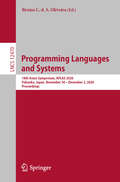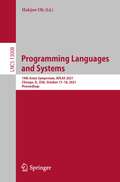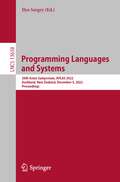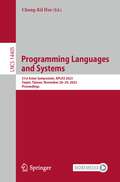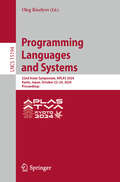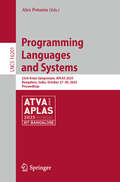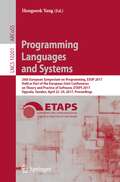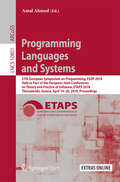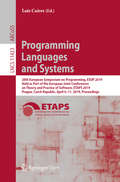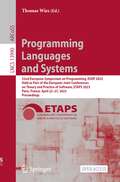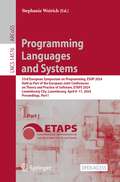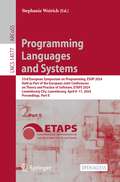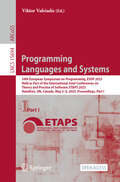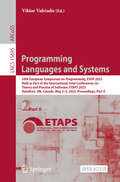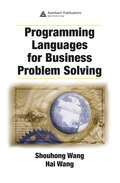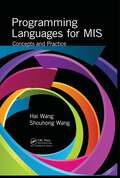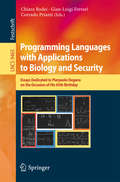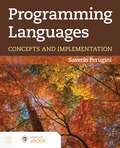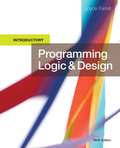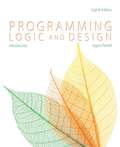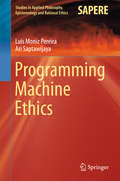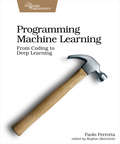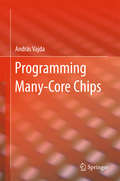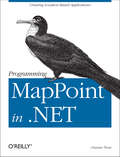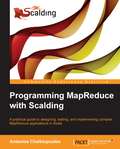- Table View
- List View
Programming Languages and Systems: 18th Asian Symposium, APLAS 2020, Fukuoka, Japan, November 30 – December 2, 2020, Proceedings (Lecture Notes in Computer Science #12470)
by Bruno C. d. S. OliveiraThis book constitutes the proceedings of the 18th Asian Symposium on Programming Languages and Systems, APLAS 2020, held in Fukuoka, Japan, in December 2020.*The 19 papers presented in this volume were carefully reviewed and selected from 46 submissions. They were organized in topical sections named: Invited Papers, Types, Program Analysis, Semantics, Language Design and Implementation, Concurrency, Verification, and Logic and Automata. * The conference was held virtually due to the COVID-19 pandemic.
Programming Languages and Systems: 19th Asian Symposium, APLAS 2021, Chicago, IL, USA, October 17–18, 2021, Proceedings (Lecture Notes in Computer Science #13008)
by Hakjoo OhThis book constitutes the proceedings of the 19th Asian Symposium on Programming Languages and Systems, APLAS 2021, held in Chicago, USA, in October 2021.* The 17 papers presented in this volume were carefully reviewed and selected from 43 submissions. They were organized in topical sections named: analysis and synthesis, compilation and transformation, language, and verification. * The conference was held in a hybrid format due to the COVID-19 pandemic.
Programming Languages and Systems: 20th Asian Symposium, APLAS 2022, Auckland, New Zealand, December 5, 2022, Proceedings (Lecture Notes in Computer Science #13658)
by Ilya SergeyThis book constitutes the proceedings of the 20th Asian Symposium on Programming Languages and Systems, APLAS 2022, held in Auckland, New Zealand, in December 2022.The 10 papers presented in this volume were carefully reviewed and selected from 22 submissions. They were organized in topical sections as follows: Semantics and Analysis; Testing and Verification; Types.
Programming Languages and Systems: 21st Asian Symposium, APLAS 2023, Taipei, Taiwan, November 26–29, 2023, Proceedings (Lecture Notes in Computer Science #14405)
by Chung-Kil HurThis book constitutes the refereed proceedings of the 21st Asian Symposium on Programming Languages and Systems, APLAS 2023, held in Taipei, Taiwan, during November 26–29, 2023.The 15 full papers included in this book are carefully reviewed and selected from 32 submissions. They were organized in topical sections as follows: semantics, logics, and foundational theory; design of languages, type systems, and foundational calculi; domain-specific languages; compilers, interpreters, and abstract machines; program derivation, synthesis, and transformation; program analysis, verification, and model-checking; logic, constraint, probabilistic, and quantum programming; software security; concurrency and parallelism; tools and environments for programming and implementation; and applications of SAT/SMT to programming and implementation.
Programming Languages and Systems: 22nd Asian Symposium, APLAS 2024, Kyoto, Japan, October 22-24, 2024, Proceedings (Lecture Notes in Computer Science #15194)
by Oleg KiselyovThis book constitutes the proceedings of the 22nd Asian Symposium on Programming Languages and Systems, APLAS 2024, held in Kyoto, Japan, during October 22-24, 2024. The 18 full papers presented here were carefully reviewed and selected from 37 submissions. These papers have been categorized under the following topical sections: Type theory and Semantic Frameworks; Probabilistic and Declarative Programming; Quantum Computation; Logical Relations; Verification.
Programming Languages and Systems: 23rd Asian Symposium, APLAS 2025, Bengaluru, India, October 27–30, 2025, Proceedings (Lecture Notes in Computer Science #16201)
by Alex PotaninThis book constitutes the proceedings of the 23nd Asian Symposium on Programming Languages and Systems, APLAS 2025, held in Bengaluru, India, October 27–30, 2025. The 13 full papers presented here were carefully reviewed and selected from 28 submissions.They were focused on the following topical sections: Type Systems, Safety, and Verification; Control, Effects, and Decidability; Quantum Programming and Logic; Program Analysis, Specifications, and Decision Procedures; AI and Compiler Optimisation for Performance.
Programming Languages and Systems: 26th European Symposium on Programming, ESOP 2017, Held as Part of the European Joint Conferences on Theory and Practice of Software, ETAPS 2017, Uppsala, Sweden, April 22–29, 2017, Proceedings (Lecture Notes in Computer Science #10201)
by Hongseok YangThis book constitutes the proceedings of the 26th European Symposium on Programming, ESOP 2017, which took place in Uppsala, Sweden in April 2017, held as Part of the European Joint Conferences on Theory and Practice of Software, ETAPS 2017.The 36 papers presented in this volume were carefully reviewed and selected from 112 submissions. They cover traditional as well as emerging topics in programming languages. In detail they deal with semantic foundation and type system for probabilistic programming; techniqu3es for verifying concurrent or higher-order programs; programming languages for arrays or web data; program analysis and verification of non-standard program properties; foundation and application of interactive theorem proving; graph rewriting; separation logic; session type; type theory; and implicit computational complexity.
Programming Languages and Systems: 27th European Symposium On Programming, Esop 2018, Held As Part Of The European Joint Conferences On Theory And Practice Of Software, Etaps 2018, Thessaloniki, Greece, April 14-20, 2018, Proceedings (Lecture Notes in Computer Science #10801)
by Amal AhmedThis open access book constitutes the proceedings of the 27th European Symposium on Programming, ESOP 2018, which took place in Thessaloniki, Greece in April 2018, held as Part of the European Joint Conferences on Theory and Practice of Software, ETAPS 2018. The 36 papers presented in this volume were carefully reviewed and selected from 114 submissions. The papers are organized in topical sections named: language design; probabilistic programming; types and effects; concurrency; security; program verification; program analysis and automated verification; session types and concurrency; concurrency and distribution; and compiler verification.
Programming Languages and Systems: 28th European Symposium on Programming, ESOP 2019, Held as Part of the European Joint Conferences on Theory and Practice of Software, ETAPS 2019, Prague, Czech Republic, April 6–11, 2019, Proceedings (Lecture Notes in Computer Science #11423)
by Luís CairesThis open access book constitutes the proceedings of the 28th European Symposium on Programming, ESOP 2019, which took place in Prague, Czech Republic, in April 2019, held as Part of the European Joint Conferences on Theory and Practice of Software, ETAPS 2019.
Programming Languages and Systems: 32nd European Symposium on Programming, ESOP 2023, Held as Part of the European Joint Conferences on Theory and Practice of Software, ETAPS 2023, Paris, France, April 22–27, 2023, Proceedings (Lecture Notes in Computer Science #13990)
by Thomas WiesThis open access book constitutes the proceedings of the 32nd European Symposium on Programming, ESOP 2023, which was held during April 22-27, 2023, in Paris, France, as part of the European Joint Conferences on Theory and Practice of Software, ETAPS 2023.The 20 regular papers presented in this volume were carefully reviewed and selected from 55 submissions. They deal with fundamental issues in the specification, design, analysis, and implementation of programming languages and systems.
Programming Languages and Systems: 33rd European Symposium on Programming, ESOP 2024, Held as Part of the European Joint Conferences on Theory and Practice of Software, ETAPS 2024, Luxembourg City, Luxembourg, April 6–11, 2024, Proceedings, Part I (Lecture Notes in Computer Science #14576)
by Stephanie WeirichThe two-volume open access book set LNCS 14576 + 14577 constitutes the proceedings of the 33rd European Symposium on Programming, ESOP 2024, which was held during April 6-11, 2024, in Luxemburg, as part of the European Joint Conferences on Theory and Practice of Software, ETAPS 2024.The 25 full papers and 1 fresh perspective paper presented in these proceedings were carefully reviewed and selected from 72 submissions. The papers were organized in topical sections as follows:Part I: Effects and modal types; bidirectional typing and session types; dependent types; Part II: Quantum programming and domain-specific languages; verification; program analysis; abstract interpretation.
Programming Languages and Systems: 33rd European Symposium on Programming, ESOP 2024, Held as Part of the European Joint Conferences on Theory and Practice of Software, ETAPS 2024, Luxembourg City, Luxembourg, April 6–11, 2024, Proceedings, Part II (Lecture Notes in Computer Science #14577)
by Stephanie WeirichThe two-volume open access book set LNCS 14576 + 14577 constitutes the proceedings of the 33rd European Symposium on Programming, ESOP 2024, which was held during April 6-11, 2024, in Luxemburg, as part of the European Joint Conferences on Theory and Practice of Software, ETAPS 2024.The 25 full papers and 1 fresh perspective paper presented in these proceedings were carefully reviewed and selected from 72 submissions. The papers were organized in topical sections as follows:Part I: Effects and modal types; bidirectional typing and session types; dependent types; Part II: Quantum programming and domain-specific languages; verification; program analysis; abstract interpretation.
Programming Languages and Systems: 34th European Symposium on Programming, ESOP 2025, Held as Part of the International Joint Conferences on Theory and Practice of Software, ETAPS 2025, Hamilton, ON, Canada, May 3–8, 2025, Proceedings, Part I (Lecture Notes in Computer Science #15694)
by Viktor VafeiadisThe open access book set LNCS 15694 + LNCS 15695 constitutes the proceedings of the 34th European Symposium on Programming, ESOP 2025, which was held as part of the International Joint Conferences on Theory and Practice of Software, ETAPS 2025, in Hamilton, Canada, during May 3-8, 2025. The 30 full papers included in the proceedings were carefully reviewed and selected from a total of 88 submissions. The proceedings also contain two short artifact reports. The papers focus on aspects of programming language research such as programming paradigns and styles; methods and tools to specify and reason about programs and languages; programming language foundations; methods and tools for implementation, concurrency and districution; and applications and emerging topics.
Programming Languages and Systems: 34th European Symposium on Programming, ESOP 2025, Held as Part of the International Joint Conferences on Theory and Practice of Software, ETAPS 2025, Hamilton, ON, Canada, May 3–8, 2025, Proceedings, Part II (Lecture Notes in Computer Science #15695)
by Viktor VafeiadisThe open access book set LNCS 15694 + LNCS 15695 constitutes the proceedings of the 34th European Symposium on Programming, ESOP 2025, which was held as part of the International Joint Conferences on Theory and Practice of Software, ETAPS 2025, in Hamilton, Canada, during May 3-8, 2025. The 30 full papers included in the proceedings were carefully reviewed and selected from a total of 88 submissions. The proceedings also contain two short artifact reports. The papers focus on aspects of programming language research such as programming paradigns and styles; methods and tools to specify and reason about programs and languages; programming language foundations; methods and tools for implementation, concurrency and districution; and applications and emerging topics.
Programming Languages for Business Problem Solving
by Shouhong Wang Hai WangIt has become crucial for managers to be computer literate in today's business environment. It is also important that those entering the field acquire the fundamental theories of information systems, the essential practical skills in computer applications, and the desire for life-long learning in information technology.Programming Languages
Programming Languages for MIS: Concepts and Practice
by Shouhong Wang Hai WangProgramming Languages for MIS: Concepts and Practice supplies a synopsis of the major computer programming languages, including C++, HTML, JavaScript, CSS, VB.NET, C#.NET, ASP.NET, PHP (with MySQL), XML (with XSLT, DTD, and XML Schema), and SQL. Ideal for undergraduate students in IS and IT programs, this textbook and its previous versions have bee
Programming Languages with Applications to Biology and Security
by Chiara Bodei Gian-Luigi Ferrari Corrado PriamiThis Festschrift volume is published in honor of Pierpaolo Degano on the occasion of his 65th birthday and is the outcome of a colloquium held in Pisa, Italy, in June 2015. Pierpaolo Degano has worked on a large variety of topics including formal program semantics, concurrency theory, systems biology and security. The volume contains 22 refereed papers and one extended abstract, including personal memoirs and regular research papers by close collaborators and friends and a laudatio illustrating his distinguished career and his main scientific contributions. The papers deal with the main research topics explored by Pierpaolo Degano and those still under his investigation.
Programming Languages: Concepts and Implementation
by Saverio PeruginiProgramming Languages: Concepts and Implementation teaches language concepts from two complementary perspectives: implementation and paradigms. It covers the implementation of concepts through the incremental construction of a progressive series of interpreters in Python, and Racket Scheme, for purposes of its combined simplicity and power, and assessing the differences in the resulting languages.
Programming Logic And Design, Introductory
by Joyce FarrellPrepare for programming success by learning the fundamental principles of developing structured program logic with Farrell’s PROGRAMMING LOGIC AND DESIGN: INTRODUCTORY, 9E. Widely used in foundational programming courses, this popular book takes a unique, language-independent approach to programming with a distinctive emphasis on modern conventions. <P><P> Noted for its clear, concise writing style, the book eliminates highly technical jargon while introducing universal programming concepts and encouraging a strong programming style and logical thinking. Frequent side notes and Quick Reference boxes provide concise explanations of important programming concepts. Each chapter also begins with a list of objectives and provides a concise summary and a list of key terms. End-of-chapter practice offers multiple-choice review questions, programming and gaming exercises, debugging exercises, and a maintenance exercise that challenges you to improve the working logic presented.
Programming Logic And Design: Introductory
by Joyce FarrellThis fully revised eighth edition of Joyce Farrell’s PROGRAMMING LOGIC AND DESIGN: INTRODUCTORY prepares student programmers for success by teaching them the fundamental principles of developing structured program logic. Widely used in foundational Programming courses, this popular text takes a unique, language-independent approach to programming, with a distinctive emphasis on modern conventions. Noted for its clear, concise writing style, the book eliminates highly technical jargon while introducing universal programming concepts and encouraging a strong programming style and logical thinking. Quick Reference boxes, a feature new to this edition, provide concise explanations of important programming concepts. Each chapter now also contains a Maintenance Exercise, in which the student is presented with working logic that can be improved. In addition to each chapter’s text-based Debugging Exercises, this edition now includes Flowchart Debugging Exercises as well.
Programming Machine Ethics
by Luís Moniz Pereira Ari SaptawijayaThis book addresses the fundamentals of machineethics. It discusses abilities required for ethical machine reasoning and theprogramming features that enable them. It connects ethics, psychologicalethical processes, and machine implemented procedures. From a technical pointof view, the book uses logic programming and evolutionary game theory to modeland link the individual and collective moral realms. It also reports on theresults of experiments performed using several model implementations. Opening specific and promising inroads into the terra incognita of machine ethics, theauthors define here new tools and describe a variety of program-tested moralapplications and implemented systems. In addition, they provide alternativereadings paths, allowing readers to best focus on their specific interests andto explore the concepts at different levels of detail. Mainly written for researchers in cognitivescience, artificial intelligence, robotics, philosophy of technology andengineering of ethics, the book willalso be of general interest to otheracademics, undergraduates in search of research topics, science journalists aswell as science and society forums, legislators and military organizationsconcerned with machine ethics.
Programming Machine Learning: From Coding to Deep Learning
by Paolo PerrottaYou've decided to tackle machine learning - because you're job hunting, embarking on a new project, or just think self-driving cars are cool. But where to start? It's easy to be intimidated, even as a software developer. The good news is that it doesn't have to be that hard. Master machine learning by writing code one line at a time, from simple learning programs all the way to a true deep learning system. Tackle the hard topics by breaking them down so they're easier to understand, and build your confidence by getting your hands dirty. Peel away the obscurities of machine learning, starting from scratch and going all the way to deep learning. Machine learning can be intimidating, with its reliance on math and algorithms that most programmers don't encounter in their regular work. Take a hands-on approach, writing the Python code yourself, without any libraries to obscure what's really going on. Iterate on your design, and add layers of complexity as you go. Build an image recognition application from scratch with supervised learning. Predict the future with linear regression. Dive into gradient descent, a fundamental algorithm that drives most of machine learning. Create perceptrons to classify data. Build neural networks to tackle more complex and sophisticated data sets. Train and refine those networks with backpropagation and batching. Layer the neural networks, eliminate overfitting, and add convolution to transform your neural network into a true deep learning system. Start from the beginning and code your way to machine learning mastery. What You Need: The examples in this book are written in Python, but don't worry if you don't know this language: you'll pick up all the Python you need very quickly. Apart from that, you'll only need your computer, and your code-adept brain.
Programming Many-Core Chips
by András VajdaThis book presents new concepts, techniques and promising programming models for designing software for chips with "many" (hundreds to thousands) processor cores. Given the scale of parallelism inherent to these chips, software designers face new challenges in terms of operating systems, middleware and applications. This will serve as an invaluable, single-source reference to the state-of-the-art in programming many-core chips. Coverage includes many-core architectures, operating systems, middleware, and programming models.
Programming MapPoint in .NET
by Chandu ThotaInteractive web maps generated by MapPoint-Microsoft's popular mapping technology are crucial for businesses in a number of fields, including real estate, package delivery, and commercial air travel. In a word, MapPoint provides businesses with "location." Specifically, it provides an integrated set of products, servers, and services to enable a business to track the precise location of remote assets, thereby reducing operational costs and improving productivity. Whether the asset is a truck, a taxi, or even a field rep, MapPoint can tell you exactly where it is at any time. Programming MapPoint in .NET from O'Reilly shows you how to use MapPoint to build custom applications for the desktop, the web, and mobile devices. The book also explains how to analyze and share data generated from a wide range of maps, including those that show demographic trends, population density, and sales potential. Chandu Thota, one of Microsoft's main MapPoint developers and the book's author, has organized the material into four major sections, each dedicated to a different MapPoint technology: MapPoint 2004 - calculating routes, rendering data maps, integrating with Global Positioning System (GPS) for obtaining real-time location MapPoint Web Service - techniques for finding points of interest, creating applications using the Find APIs and Route APIs, rendering LineDrive maps and polygonsMapPoint Location Server - deployment scenarios, getting real-time location using mobile phones, managing contacts and privacy settings MSN Virtual Earth - the basics of programming with new MSN Virtual Earth APIs The book provides a jumpstart for working with these technologies, including in-depth discussions about the core concepts and sample code provided in C#. It's ideal for anyone who wants to develop locations-based applications with MapPoint technologies. The next time you follow online directions to the airport, you can chalk up an assist to MapPoint's state-of-the-art interactive mapping abilities. Better yet, you'll know how to create that same type of map yourself.
Programming MapReduce with Scalding
by Antonios ChalkiopoulosThis book is an easy-to-understand, practical guide to designing, testing, and implementing complex MapReduce applications in Scala using the Scalding framework. It is packed with examples featuring log-processing, ad-targeting, and machine learning. This book is for developers who are willing to discover how to effectively develop MapReduce applications. Prior knowledge of Hadoop or Scala is not required; however, investing some time on those topics would certainly be beneficial.
